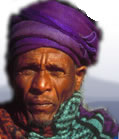 |
 |
||
 |
|||
|
RELATED THEMES communications education family life gender justice and crime social institutions OTHER LOCAL THEMES BACKGROUND |
social relationships
Economic change has been accompanied by changes in social relations, some apparently for the better and some not. The majority of narrators speak of closer relations between Christians (mostly living in the highlands) and Muslims (mostly in the lowlands), who now own land on an equal basis. In the highlands they can grow barley and in the lowlands beans, so there is a reciprocity between the two groups in order to access both food stuffs. There is also a gradual lessening of superstitious and hostile attitudes towards artisans of most kinds, and particularly blacksmiths, formerly believed to be "evil-eyed" and to eat people. Nevertheless, such attitudes have not been eradicated altogether and some of the artisans speak of the discrimination they still experience. Intermarriage between members of different groups is still generally frowned upon. Almost all narrators speak with regret of the decline in hospitality and social welfare. In the past people took it in turn to look after the elderly and disabled, who stayed for between a few days and a month in one house and were then taken to another. Such arrangements would continue until they died, when the community or a rich individual would cover the cost of burial expenses. This practice has now ceased and families are no longer able even to support their own elderly or vulnerable relatives. According to one narrator (Ethiopia 19) there is some state provision in the towns of homes for "the blind and other disabled persons". Several claim that tensions, and incidents of theft, have increased with the growing population and pressure on scarce resources. The main causes of conflict mentioned are the diversion of streams for irrigation, boundary disputes and livestock straying on to neighbours' land. "[When] livestock.stray into somebody's territory, quarrels erupt and people kill each other nowadays" (Ethiopia 3). quotes about social relationships"Our fathers used to take turns to feed, clothe and support those who were disabled or were old and without any relatives to help them.hence the childless and the disabled were not abandoned in their old age. Now. even those who have relatives have nobody to look after them." "Muslims and Christians? Muslims were not [even] looked upon then. Now, however, they eat and drink and work together, and everything has been equalised... In the old days the Muslims did not have land, they had to till somebody's land on the basis of equal share. Now they have received land equally with the others. That is the change now." "Christians and Muslims did not have a harmonious relationship in the past, but now they are like children from the same mother. They do not quarrel with each other now." "When the wolf sees the antelope, it runs to eat it and the antelope flees to save its life. Nowadays people are like this, too. The highlanders have a low regard for the lowlanders and vice versa. They quarrel with each other." "The farmers and the artisans have close relationships; they invite each other for weddings, christenings and commemoration of saints' days. However, some people say that the blacksmiths eat other people, but I have never come across such a thing where I live and I don't believe the story." "Blacksmiths? Well, we do our work and they do theirs. Of course, we look down on them; that is inevitable... It is a cultural prejudice. People say they eat other people (they are evil-eyed) and so we fear them." |
|